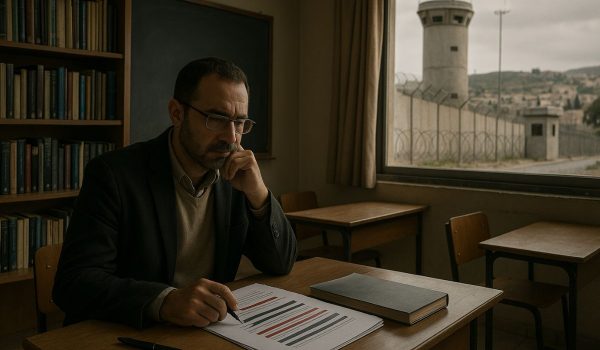Academic freedom allows students and educators to ask questions, challenge ideas, and contribute to knowledge without fear. In many parts of the world, this freedom is central to a healthy and open society. But in Palestine, that freedom faces serious challenges—shaped by occupation, political pressure, and structural inequality.
Universities in the West Bank and Gaza are not just places of learning. They are also spaces for dialogue, political thought, and community connection. When academic freedom is threatened, it affects more than classrooms. It limits how people understand their own history, how they engage with the world, and how they build futures rooted in justice and truth.
What This Article Covers
This article highlights the current trends in academic freedom in Palestine. It looks at how students, faculty, and institutions navigate restrictions and risk. It covers recent developments, common obstacles, and how communities continue to defend education as a right.
You’ll read about the impact of movement restrictions, censorship, funding challenges, and political interference—and how individuals respond with creativity, persistence, and care.
Movement as a Barrier to Learning
One of the most direct threats to academic freedom in Palestine is restricted movement. Students and professors often face delays or denials when trying to travel between campuses or abroad for research, conferences, and study.
This limitation affects collaborations, degree completion, and access to global knowledge. For example, students from Gaza accepted to universities in the West Bank frequently cannot attend. Faculty invited to speak at international events may be unable to leave.
These barriers isolate Palestinian academic spaces. They limit access to resources and reduce opportunities for intellectual exchange. Learning is shaped not only by what’s taught but by who is allowed to be in the room.
Campus Raids and Surveillance
University campuses in Palestine have experienced military raids, student arrests, and surveillance. These actions send a clear message that academic spaces are not entirely safe or free.
Student groups are often monitored. Political expression through clubs or publications can result in detention or interrogation. Faculty members have also faced arrest or harassment for their writing or activism.
This climate of fear can lead to self-censorship. When people worry that speaking out might bring consequences, they may choose silence. That silence erodes academic freedom from within, making it harder to challenge ideas or engage in critical thinking.
Political Pressure from Multiple Sides
In addition to external threats, Palestinian universities also face pressure from within. Political factionalism can influence student life, hiring, and curriculum choices. In some cases, internal divisions shape who gets support and whose voices are included.
This makes it difficult for universities to serve as neutral ground. It adds tension to classrooms and can limit open dialogue. Students may avoid expressing certain views, not only out of fear of outside forces, but also due to peer or institutional pressure.
Academic freedom depends on trust, fairness, and a shared commitment to learning. When politics overshadows these values, the classroom becomes another battleground instead of a space for growth.
Challenges in Research and Publishing
Producing knowledge is a core part of academic life. But in Palestine, conducting research—especially on sensitive topics—can be risky. Scholars may face funding shortages, bureaucratic delays, or even accusations based on their research topics.
Publishing work internationally is another challenge. Some journals and institutions hesitate to include Palestinian perspectives, either due to political concerns or lack of access. This exclusion limits global understanding and reinforces harmful gaps in knowledge.
Despite this, many Palestinian scholars continue to produce important work. They find creative ways to publish, collaborate, and share their findings. Their persistence ensures that the world hears voices that might otherwise be silenced.
Online Spaces: A Mixed Opportunity
With in-person mobility so restricted, many educators and students turn to online platforms for learning, sharing, and connecting. This shift offers new possibilities—digital seminars, international lectures, and collaborative projects.
But it also comes with risks. Online spaces are not always safe. Surveillance extends into digital classrooms. Students may hesitate to speak freely, knowing that online activities can be tracked.
Access to stable internet and technology also varies widely. In Gaza, for example, power outages and limited infrastructure make regular access difficult. This creates unequal learning environments and adds stress to students already facing hardship.
Building Resilience Through Education
Despite all of this, Palestinian academic life continues. Teachers teach. Students study. Communities gather to talk, reflect, and imagine. These acts are not just about knowledge—they are about hope.
Universities create space for new ideas and future plans. They offer young people a chance to think beyond current conditions. They nurture pride in culture and language. And they keep alive the possibility that justice and freedom are worth learning for.
Local initiatives and international partnerships also play a role. Exchange programs, solidarity networks, and resource-sharing projects help keep Palestinian academic voices present in global conversations.
Defending the Right to Learn
Academic freedom is not a luxury. It’s a foundation for dignity, progress, and community strength. In Palestine, defending this freedom means more than protecting speech. It means protecting the right to learn, to grow, and to belong to a world of ideas.
When academic spaces are attacked, the damage goes beyond buildings or classrooms. It strikes at imagination, memory, and the belief that better futures can be built.
But each student who keeps showing up, each teacher who keeps preparing lessons, and each researcher who keeps asking questions is part of something powerful. They are not just working toward degrees—they are defending the right to think, to teach, and to be heard.

